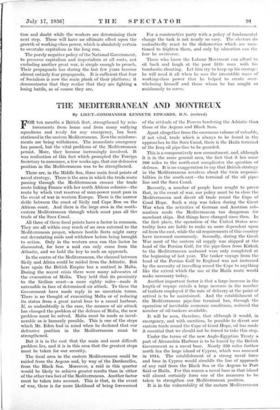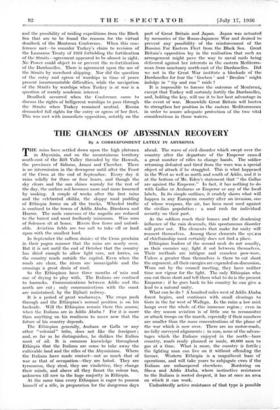THE MEDITERRANEAN AND MONTREUX
By LIEUT.-COMMANDER KENNETH EDWARDS, R.N. (retired)
FOR ten months a British fleet, strengthened by rein- forcements from home and from many outlying squadrons and ready for any emergency, has been stationed in the eastern Mediterranean. Now the reinforce- ments are being withdrawn. The immediate emergency has passed, but the vital problems of the Mediterranean persist. More, they become increasingly involved. It was realisation of this fact which prompted the Foreign Secretary to announce, a few weeks ago, that our defensive position in the Mediterranean was to be strengthened.
There are, in the Middle Sea, three main focal points of naval strategy. There is the area in which the trade route passing through the Mediterranean crosses the trade route linking France with her north African colonies—the route by which vast reserves of man-power must pass in the event of war in western Europe. There is the narrow defile between the coast of Sicily and Cape Bon on the African coast. And there is the large area in the south- eastern Mediterranean through which must pass all the trade of the Suez Canal.
All three of these focal points have a factor in common. They are all within easy reach of an area external to the Mediterranean proper, whence hostile fleets might carry out devastating raids and withdraw before being brought to action. Only in the western area can this factor be discounted, for here a raid can only come from the Atlantic, and we hold the key to such an approach.
In the centre of the Mediterranean, the channel between Sicily and Africa could be raided from the Adriatic. But here again the British Empire has a sentinel in Malta. During the recent crisis there were many advocates of the evacuation of Malta. They held that its proximity to the Sicilian coast—a mere eighty miles—made it untenable in face of determined air attack. To these the Government have made reply in no uncertain terms. There is no thought of evacuating Malta or of reducing its status from a great naval base to a casual harbour. If, as undoubtedly is the case, the menace of air attack has changed the problem of the defence of Malta, the new problem must be solved. Malta must be made as invul- nerable as is humanly possible. This is one of the steps which Mr. Eden had in mind when he declared that our defensive position in the Mediterranean must be strengthened.
But it is in the east that the main and most difficult problem lies, and it is in this area that the greatest steps must be taken for our security.
The focal area in the eastern Mediterranean could be raided from the Aegean and, by way of the Dardanelles, from the Black Sea. Moreover, a raid in this quarter would be likely to achieve greater results than in either of the other two foci of the Mediterranean. Another factor must be taken into account. This is that, in the event of war, there is far more likelihood of being forewarned of the attitude of the Powers bordering the Adriatic than those of the Aegean and Black Seas.
Apart altogether from the enormous volume of valuable, if not vital, trade which is always to be found in the approaches to the Suez Canal, there is the Haifa terminal of the Iraq oil pipe-line to be guarded.
This is a comparatively new commitment, and, although it is in the same general area, the fact that it lies sonic 200 miles to the north-east complicates the question of defence. It is no exaggeration to say that British strategy in the Mediterranean revolves about the twin responsi- bilities in the south-east—the terminal of the oil pipe- line and the Suez Canal.
Recently, a number of people have sought to prove that, in the event of war, our policy must be to close the Mediterranean and divert all trade round the Cape of Good Hope. Such a step was taken during the Great War when the activities of German and Austrian sub- marines made the Mediterranean too dangerous for merchant ships. But things have changed since then. In the first place, the operation of the United States neu- trality laws are liable to make us more dependent upon oil from the cast, while the oil requirements of this country have increased enormously. Secondly, during the Great War most of the eastern oil supply was shipped at the head of the Persian Gulf, for the pipe-lines from Kirkuk to the Mediterranean seaboard were only completed at the beginning of last year. The tanker voyage from the head of the Persian Gulf to England was not increased by the necessity of travelling round the Cape to anything like the extent which the use of the Haifa route would make necessary today.
Another important factor is that a large increase in the length of voyage entails a large increase in the number of tankers employed if the rate of delivery at the point of arrival is to be maintained. And the establishment of the Mediterranean pipe-line terminal has, through the operation of inevitable economic conditions, reduced the number of oil-tankers available.
It will be seen, therefore, that although it would, in emergency, and with sacrifices, be possible to divert our eastern trade round the Cape of Good Hope, oil has made it essential that we should not be forced to take this step.
Under the terms of the new Anglo-Egyptian Treaty a part of Alexandria Harbour is to be leased by the British Government as a naval base. Nearly 250 miles further north lies the large island of Cyprus, which was annexed in 1914. The establishment of a strong naval force and base in Cyprus would straddle the line of approach of any raid from the Black Sea or the Aegean to Port Said or Haifa. For this reason a naval base in that island will almost certainly form one of the measures to be taken to strengthen our Mediterranean position.
It is in the vulnerability of the eastern Mediterranean and the possibility of raiding expeditions.from the Black Sea that are to be found the . reasons for. the virtual deadlock of the Montreux Conference. When this con. ference met—to consider Turkey's claim to revision of the Lausanne Treaty of 1923 forbidding the fortification of the Straits—agreement, appeared to be almost in sight. No Power could object to or prevent the re-fortification of the Dardanelles. There is agreement upon the use of the Straits by merchant shipping. Nor did the question of the entry and egress of warships in time of peace present insurmountable difficulties, while the navigation of the Straits by warships when Turkey is at war is a question of merely academic interest.
Deadlock occurred when the Conference came to discuss the rights of belligerent warships to pass through the Straits when. Turkey remained neutral. Russia demanded full rights for the entry or egress of her fleet. This was met with immediate opposition, notably on the part of Great Britain and Japan. Japan was 'actuated by memories of the Russo-Japanese War and desired to prevent any possibility of the reinforcement of the Russian Far Eastern Fleet from the Black Sea. Great Britain's opposition lay in the realisation that such an arrangement might pave the way to naval raids being delivered against her interests in the eastern Mediterra- nean from sanctuary north-east of the Dardanelles. Did we not in the Great War institute a. blockade of the Dardanelles for fear the Goeben ' and ' Breslau ' might indulge in " tip and run " raids ?
It is impossible to foresee the outcome of Montreux, except that Turkey will certainly fortify the Dardanelles, and, holding the ley, will use it to her best advantage in the event of war. Meanwhile Great Britain will hasten to strengthen her position in the eastern Mediterranean in order to assure adequate protection of the two vital considerations in those waters.















































 Previous page
Previous page